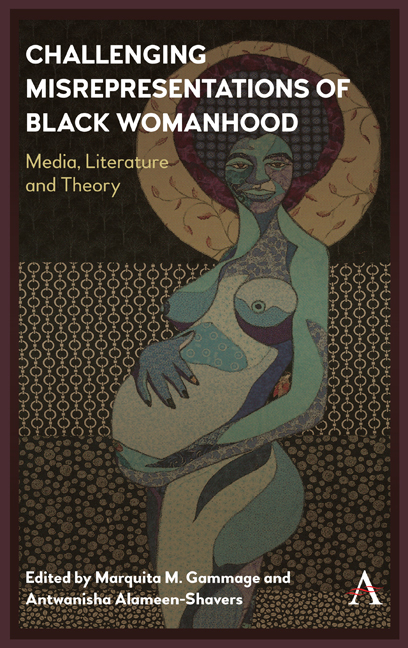Book contents
- Frontmatter
- Contents
- List of Figures
- Acknowledgments
- Introduction
- Chapter 1 Black Student Mothers: A Culturally Relevant Exploratory Study
- Chapter 2 Uninhabitable Moments: The Symbol of Serena Williams, Rage and Rackets in Claudia Rankine's Citizen: An American Lyric
- Chapter 3 “Black Women Are Genius!”: The Image of Celebrated Black Motherhood in Stand-Up Comedy?
- Chapter 4 The Virility of the Haitian Womb: The Biggest Threat to the Dominican Right
- Chapter 5 Ladyhood in Distress: Neoliberalism and Black Politics in Nicole Sconiers's Escape from Beckyville: Tales of Race, Hair, and Rage
- Chapter 6 Sapphires Gone Wild: The Politics of Black Women's Respectability in the Age of the Ratchet
- Chapter 7 Representing the Black Woman as Immoral and Abandoning the Black Family: A Cultural Analysis of Twenty-First-Century Television Dramas Starring Black Women
- Chapter 8 Historical Miseducation on Black Womanhood
- Chapter 9 Michelle Obama Laughs: Political Meme Warfare and the Regurgitation of the Mythological Black Woman
- Chapter 10 Kawaida Womanism as an Interpretative Framework for Understanding Africana Womanhood: Analyzing African American Women's Self-Perceptions
- List of Contributors
- Index
Chapter 10 - Kawaida Womanism as an Interpretative Framework for Understanding Africana Womanhood: Analyzing African American Women's Self-Perceptions
Published online by Cambridge University Press: 29 May 2019
- Frontmatter
- Contents
- List of Figures
- Acknowledgments
- Introduction
- Chapter 1 Black Student Mothers: A Culturally Relevant Exploratory Study
- Chapter 2 Uninhabitable Moments: The Symbol of Serena Williams, Rage and Rackets in Claudia Rankine's Citizen: An American Lyric
- Chapter 3 “Black Women Are Genius!”: The Image of Celebrated Black Motherhood in Stand-Up Comedy?
- Chapter 4 The Virility of the Haitian Womb: The Biggest Threat to the Dominican Right
- Chapter 5 Ladyhood in Distress: Neoliberalism and Black Politics in Nicole Sconiers's Escape from Beckyville: Tales of Race, Hair, and Rage
- Chapter 6 Sapphires Gone Wild: The Politics of Black Women's Respectability in the Age of the Ratchet
- Chapter 7 Representing the Black Woman as Immoral and Abandoning the Black Family: A Cultural Analysis of Twenty-First-Century Television Dramas Starring Black Women
- Chapter 8 Historical Miseducation on Black Womanhood
- Chapter 9 Michelle Obama Laughs: Political Meme Warfare and the Regurgitation of the Mythological Black Woman
- Chapter 10 Kawaida Womanism as an Interpretative Framework for Understanding Africana Womanhood: Analyzing African American Women's Self-Perceptions
- List of Contributors
- Index
Summary
Introduction
Perceptions of African/Black/Africana women abound in both the public and the private sector. Images of Black women have been cascaded around the world for centuries, projecting messages about their humanity and giving meanings to their womanhood. Much of the media footprint created has grossly de-emphasized the importance of Black women's self-perceptions and self-definitions. The intentionality of this approach can be traced to the justification of colonialism in Africa and the enslavement of African peoples. That is to say, the systematic domination over Black women's image was and is part of a larger system of racial oppression. From the marketing of Saarjte Baartman, the young Khoisan women enslaved in Europe in the early nineteenth century and forced to perform in a traveling zoo as the Hottentot Venus, to the framing of Michelle Obama, the former first lady of the United States of America, as a terrorist baby-mama of slave descent, representations of Black women symbolize the innate inferiority of the African race and therefore validate the calculated exploitation of Africa and African peoples.
Not much has changed over the centuries in terms of the politics, scholarship and media treatment of Black women. While the terminology used to describe Black womanhood has altered, remnants of the same racist and sexist ideologies remain and contribute to faulty perceptions of Black women. Notwithstanding this subjugation, Black women continue to define their womanhood for themselves, in the same way that classical African societies constructed civilizations. Yet, too little attention is granted to the power behind Black women's self-definition and identity reclamation. In addition, inadequate theoretical frameworks have consistently been used when assessing Black women's self-perceptions, which result in increased validation for the misperceptions of their womanhood. The aim of this chapter is to present a theoretical model grounded in African cultures and principles of womanhood as an interpretative framework for assessing Africana/African/Black women's self-perceptions. My intention is to recommend informative approaches to constructing representations of Black women that are rooted in their realities from their perspectives.
Methodology
Operating as a governing framework aligned with the cultural necessities of Africana women, Kawaida womanism is birthed out of African peoples’ history, lives and struggles as a collective community for the total liberation of African communities around the world.
- Type
- Chapter
- Information
- Challenging Misrepresentations of Black WomanhoodMedia, Literature and Theory, pp. 181 - 192Publisher: Anthem PressPrint publication year: 2019



